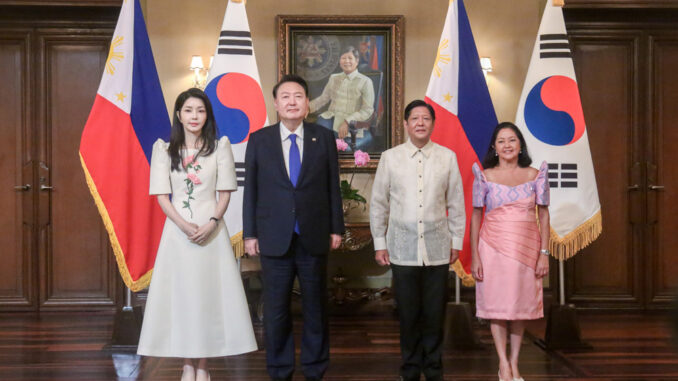
To boost maritime ties, conduct nuke plant study
The Philippines and South Korea on Monday forged six new pacts, including agreements on strengthening maritime cooperation and a feasibility study on the Bataan Nuclear Power Plant rehabilitation as the two countries agreed to elevate bilateral ties to a “strategic partnership.”
“I would like to manifest our willingness to proactively work towards sustaining our cooperation and further deepening our unbreakable bond with the Republic of Korea,” President Marcos said in his remarks during the luncheon hosted for South Korean President Yoon Suk Yeol.
Marcos and Yoon both agreed to elevate bilateral ties to a strategic partnership to bring “further impetus to the strengthening and deepening” of the cooperation between the two countries.
“We agreed that we have made significant strides in advancing and deepening our bilateral cooperation towards the attainment of our mutually beneficial goals,” Marcos said.
Both countries inked memoranda of understanding (MOU) on maritime cooperation between the Philippine Coast Guard and the Korea Coast Guard, on Economic Innovation Partnership Program, on Strategic Cooperation on Critical Raw Material Supply Chains; and on the Feasibility Study of Bataan Nuclear Power Plant; a loan agreement on Samar Coastal Road II Project; and the implementation program of the MOU between the Department of Tourism and the Korean Ministry of Culture, Sports, and Tourism for 2024-2029.
The BNPP feasibility study will be executed between the Department of Energy and the Korea Hydro and Nuclear Power Co., Ltd. (KHNP).
“The signing of this MOU builds on the strong foundation of energy cooperation between the two countries. For the Philippines, it is a continuation of our efforts to enhance energy security, as outlined in the Philippine Energy Plan (PEP),” Energy Secretary Raphael Lotilla said in a statement.
Under the MOU, KHNP will shoulder the entire cost of conducting the technical and economic feasibility study for the BNPP.
The study aims to assess the viability, safety, and sustainability of various nuclear energy options, as well as help the Philippine government make well-informed decisions on pursuing nuclear energy to support the country’s long-term energy goals.
The DOE said the feasibility study would be done in two phases—first, assessing the current condition of BNPP, and second, evaluating if it is viable to revive the BNPP based on the data being gathered from the first phase of the study.
KHNP is the operator of the Kori Nuclear Power Site in Busan, which is an identical nuclear facility to the mothballed BNPP.
Under the PEP, the Philippines targets to have the first nuclear power plant in 2032 with a capacity of 1,200 megawatts, expanding to 2,400 MW by 2035 and reaching 4,800 MW by 2050.
Speaker Martin Romualdez, during the state luncheon, expressed Congress’ commitment to support the strategic initiatives aimed at strengthening ties with South Korea.
“Congress is fully committed to nurturing and expanding our dynamic and multifaceted relations with South Korea. This partnership is vital to achieving shared prosperity and mutual growth,” Romualdez said.
Romualdez highlighted the significance of Yoon’s visit as it sets the stage for an even closer partnership, particularly in areas such as defense modernization, economic collaboration, and cultural exchange.
“The elevation of our relations to a strategic partnership signals our shared commitment to navigate the increasingly complex global landscape together,” he said, adding that South Korea has been a key partner in defense and security.
“South Korea is a trusted defense partner, and their support for our military modernization and the Philippine Coast Guard is crucial to strengthening our national security and territorial integrity,” Romualdez said.
Yoon is the first South Korean leader to visit the country since 2011. He is in Manila for a two-day state visit upon the invitation of Mr. Marcos.
Bilateral relations between the two countries began on March 3, 1949 when the Philippines became the fifth nation to recognize the Republic of Korea.
The friendship was cemented by the deployment of the Philippine Expeditionary Force to Korea (PEFTOK) during the Korean War in the 1950s.


Be the first to comment